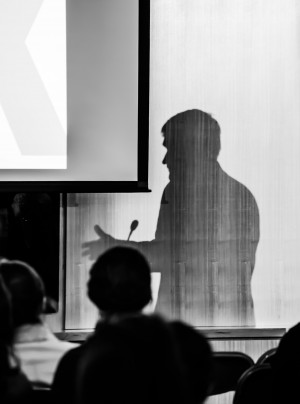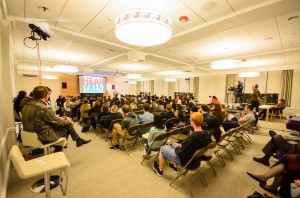
Tuesday night, BU’s Faculty in Residence Program hosted its third installation of Rhett Talks, a lecture series dedicated to promoting faculty-student interaction outside the classroom.
The talks, organized in conjunction with the Dean of Students Office and BU Residence Life, were modeled after the Tedx Talks. They are being held once a week throughout the month of September.
Each week, the program brings three BU faculty members directly into the dorms and gives them each 10 to 15 minutes to speak on any topic of their choosing. Students are then invited to stick around for an informal reception to continue the discussion with their peers and professors.
Professor Nathan Phillips of BU’s Department of Earth & Environment started the night off with “The Ecology of Boston,” recounting his studies on Boston’s infrastructure system and its relation to the functional processes carried out in trees.
“We’re really getting a sense of the pulse of the city,” said Phillips. “I continue to use the tree as a lens to look at Boston and its urban ecology.”
Professor of International Relations Andrew Bacevich spoke next on “How the United States Became Mired in the Middle East.” Looking back on the past 30 years of US foreign policy, he argued that the various US military interventions in the Middle East are simply bits and pieces of a larger story. When connected, they reveal America’s unwillingness to accept that its power may be irrelevant in the Middle East.
Bacevich expressed doubt that the United States could put things right in the Middle East and directed a pointed question toward the forces prolonging US military presence in the region: “So, how’s it going?”
Associate Professor of Humanities Adam Sweeting brought the night to a close with “Tropical New England.” Imagining what New England might look like in the next 50 to 70 years, Sweeting used poetry and art to illustrate various New England icons that may soon disappear due to the effects of global warming. After highlighting a line of Robert Frost’s poetry, reading “but I am done with apple picking,” Sweeting questioned whether New Englanders would one day be done with apple picking, as temperature increases in the region threaten the health of apple orchards.

Kilachand Hall’s study room, the location for this week’s event, boasted an almost full house, with students engaging far more in each talk’s brief question and answer period than in those at the past two installments.
While some students enjoyed seeing their professors present material in a context other than the classroom, others were glad to have the opportunity to listen to professors whom, because of differences in fields of study, they may never have gotten the chance to meet.
“It’s nice to see it again,” said Sara Leonard, SED ’14, who attended a previous installation of Rhett Talks. “It’s wonderful to hear professors speak here, because I’m never going to be in their classrooms.”
The Rhett Talks series concludes next Monday at 10 Buick Street. The event will start at 7 p.m. and will feature Professor of Psychology Deborah Belle, Associate Professor of Biomedical and Mechanical Engineering Tyrone Porter, and director Duy Doan.

